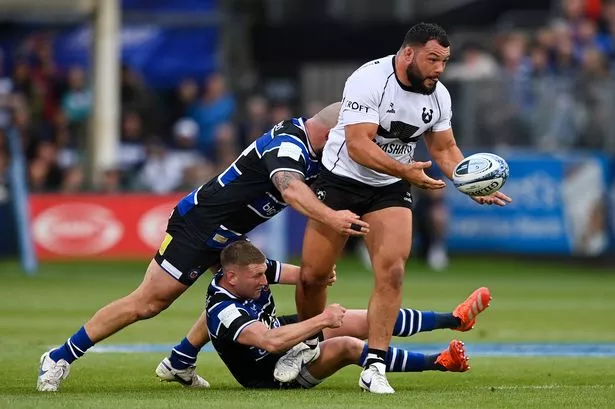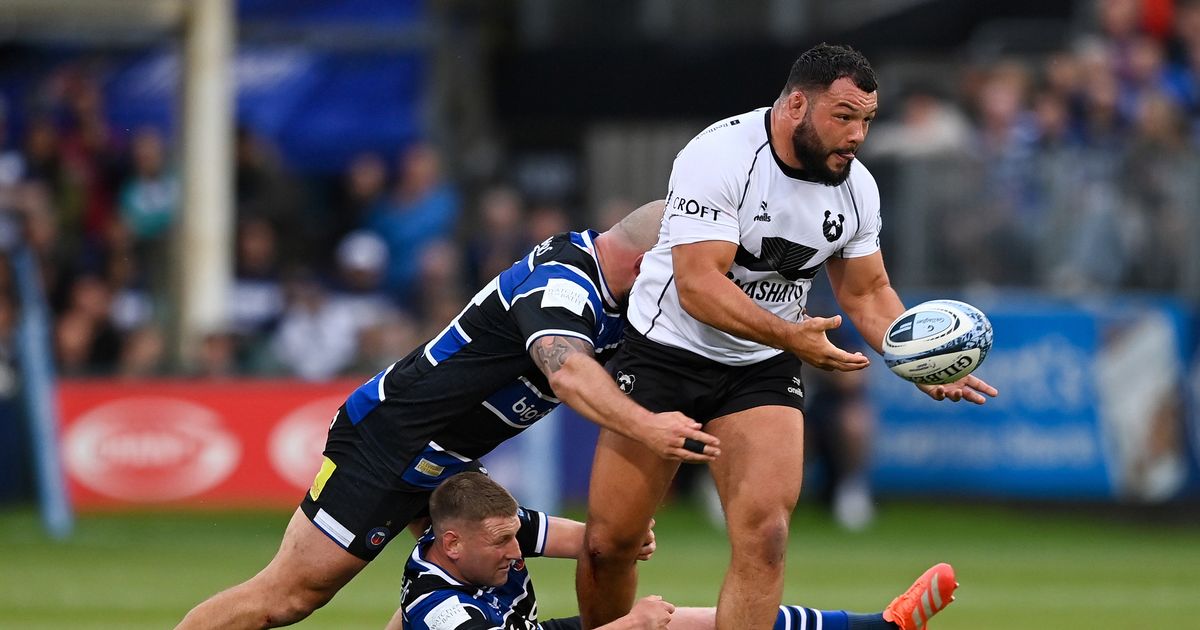Every side was in the red in the last financial year and experts are warning over the future of the sport Ellis Genge of Bristol Bears offloads the ball after being tackled by Tom Dunn and Finn Russell of Bath Rugby (Photo by Patrick Khachfe/Getty Images)
Ellis Genge of Bristol Bears offloads the ball after being tackled by Tom Dunn and Finn Russell of Bath Rugby (Photo by Patrick Khachfe/Getty Images)
All of the Gallagher Premiership rugby clubs including Bristol Bears are making significant financial losses with experts warning the sport is reaching a “crisis” point. Rugby has long-relied on wealthy benefactors or owners to keep clubs afloat and pay outstanding debts.
Worcester Warriors, Wasps and London Irish have already disappeared from the league, which announced its fixtures for the 2025-26 season this week, but more teams could go bust if the sport does not make changes, according to sports finance experts.
Analysis of Companies House documents by our sister website Business Live reveals that every team in the Premiership was in the red for the financial year ending June 30, 2024.
Despite a heroic effort by Bristol Bears in the Premiership semi-final in June, the club’s title hopes were dashed by rivals Bath at The Rec. The Somerset side went on to secure an historic win against Leicester Tigers to take their first title in 29 years.
But off the pitch both Bristol and Bath are facing major financial challenges.
Bristol Rugby Club Limited – the operating company behind the club – turned over £11.9m in the last financial year, but made a loss of £4.8m.
Bath Rugby Limited, meanwhile, turned over £20.8m for the period, up on the £19.7m the year before, but still made a loss of £3.6m, while its net debt stood at £17.2m.
According to a rugby finance report published by Leonard Curtis last year, while some teams may break even or turn a small profit in the next two years, the prospect of the current overall loss-making trend being reversed looks slim.
Many of the Premiership clubs would, in fact, be “defunct” if they were “normal businesses”, says Christina Philippou, associate professor in accounting and sport finance in the School of Accounting, Economics and Finance at the University of Portsmouth.
“Rugby at the very basics is a loss-making industry and 60 per cent [of clubs] are technically insolvent,” she said.
Professor Philippou says broadcasting deals and competition from countries like France, drawing top players out of the league with tax incentives, has proved challenging for the sport.
“Rugby is [also] shooting itself in the foot by going behind a paywall with broadcasting deals. People need to be able to watch it.
“You can do that by splitting broadcasting agreements or being clever with digital content to get people interested in the club game, and then that can pull through into actual money.”
But she says clubs losing money does not necessarily sound “the death knell” for the Premiership, and that rugby could learn some lessons from cricket.
“Tapping into other formats might be a way forward for the sport,” she explained. “That is how cricket is rejuvenating itself as it had a similar issue.”
‘There is a crisis’
Rob Wilson, a professor of applied sport finance and director of specialist sports consultancy Play it Forward, believes the salary cap – the limit on the total amount of money clubs can spend on players’ wages each season – is still too high.
For the 2025-26 season, the Premiership has confirmed the salary cap is £6.4m, with a number of credits and exclusions, meaning that clubs can spend at least £7.8m plus an excluded player salary.
“A lot of clubs see it as a target rather than a limit and then they overspend,” Professor Wilson told Business Live. “Clubs need to start spending less than they earn on a cost basis.”
He also believes rugby clubs need to be doing more on social media to engage a younger audience.
“There is a lot of demand… football has managed to develop a professional following, but rugby is not as big or working in the same environment, and it is very difficult,” he added.
“There is a crisis with three teams going out of business and a shortening of the league. I think they should close off the league for a while and focus on the top 10 clubs. It wouldn’t be a popular decision but it would be a sensible one.”
All the rugby clubs were contacted for comment. The only clubs to respond were Newcastle Falcons and Leicester Tigers, but neither provided a statement.
Finances of Gallagher Premiership clubs
Bath Rugby
Year ended June 30, 2024
Operating company: Bath Rugby Limited
Turnover: £20.8m
Loss for financial year: £3.6m
Bristol Bears
Year ended June 30, 2024
Operating company: Bristol Rugby Club Limited
Turnover: £11.9m
Loss for the financial year: £4.8m
Gloucester Rugby
Year ended June 30, 2024
Operating company: Gloucester Rugby Limited
Turnover: £14.9m
Loss for the financial year: £516,355
Leicester Tigers
Year ended June 30, 2024
Operating company: Leicester Football Club Plc
Turnover: £21m
Loss for the financial year: £3.5m
Sale Sharks
Year ended June 30, 2024
Operating company: Manchester Sale Rugby Club Limited
Turnover: £9.1m
Loss for the financial year: £7m
Saracens
Year ended June 30, 2024
Operating company: Saracens Limited
Turnover: £22.7m
Loss for the financial year: £7.5m
Northampton Saints
Year ended June 30, 2024
Operating company: Northampton Saints Plc
Turnover: £21.9m
Loss for the financial year: £826,024
Harlequins
Year ended June 30, 2024
Operating company: Harlequin Football Club Limited
Turnover: £29.3m
Loss for the financial year: £1.86m
Exeter Chiefs
Year ended June 30, 2024
Operating company: Exeter Rugby Club Limited
Turnover: £21.6m
Loss for the financial year: £876,112
Newcastle Falcons
Accounts currently overdue for the year ended June 30, 2024. Last accounts available made up to June 30, 2023
Operating company: Newcastle Rugby Limited
Turnover: £11.2m
Loss for the financial year: £2.3m
